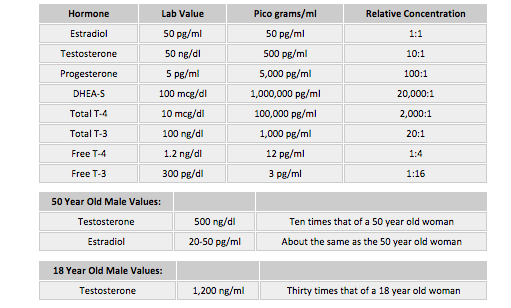|
Normal Hormone Proportions
One would think that the general order of magnitude of various hormone levels would have been made clear in medical, nursing or undergraduate school. Obviously, women make lots of estrogen and men make lots of testosterone, right? Women must certainly make a lot more estrogen than testosterone, right? We hardly hear about androstenedione and dehydroepiandrosterone, so probably not a big deal since they only come up occasionally. That certainly must be true. WRONG!
Let's take a look at the proportions of the various hormones to get a better feel for what is going on. Interpretation of laboratory work and managing replacement and supplemental therapy require a basic understanding of what is circulating in the serum and how it affects available hormone levels. Unit Nomenclature: |
|
Estradiol:
Estradiol is really powerful stuff. A normal young woman starts her menstrual cycle at about 20-40 pg/ml. Just before ovulation, common serum levels are 150-280 pg/ml which equates to 20-280 parts per trillion in her serum. A menopausal woman on HRT ranges from 20-100 pg/ml. A Vivelle Dot 0.0375 mg/day patch will achieve serum levels of about 25 pg/ml. The strongest patch, Vivelle Dot 0.1 mg/day will give levels around 80 pg/ml. For many menopausal women, that is too high. Progesterone: Progesterone is less powerful. A normal mid-luteal phase young woman has typical progesterone levels of 10-20 ng/ml—10-20 parts per billion in her serum. Progesterone 100 mg pills, capsules or tablets given at bedtime will yield blood test results (drawn the next day) of about 1.5-8.0 ng/mg— one ng/ml = 1,000 pg/ml. A woman on HRT with typical values of:
She has 100 times as much progesterone in her serum as estradiol. This is why there will never be a bioidentical progesterone patch. It would have to be very big— there is much more progesterone in the blood than estradiol. Testosterone: Typical testosterone at any age is between 20-70 ng/dl. Pay attention, as labs have changed the serum quantity units. This is nanograms/deciliter. The nanograms are just like progesterone but the serum quantity has changed from amounts per milliliter to deciliter, which is one hundred times bigger. There are 10 dl in a liter and 1,000 ml in a liter — 50 ng/dl is only 0.5 ng/ml. Back to the typical HRT woman:
The above levels indicate she has:
DHEA-S DHEA and DHEA-S gradually declines with age. The normal values from the lab present such a huge range as to be considered useless. I usually get DHEA-S because it is entirely adrenal in origin and I use it as a measure of adrenal output and health. There will be a separate article on adrenal, but there are some things worth noting: Healthy women in their 20s have levels around 200 mcg/dl. I find that PCOS patients have even higher levels. This has been documented in other publications, but I have never found a good explanation. Good levels for a 50-year-old woman should be around 100 mcg/dl. Let's look at the units again. One mcg or microgram is one part per million. Compared with estradiol:
Returning to a typical menopausal patient with a HRT estradiol of 50 pg/ml:
Taking a final look at the typical, healthy HRT patient: |
|
By the way, after looking at values for about 200,000 patients, the values I have chosen are typical for women who are vibrant, healthy and active — these are what I consider to be real normal values. Dropping male testosterone affects libido and erectile function, but so does rising estrogen. Abdominal fat converts testosterone into estradiol in both sexes. Giving extra testosterone to obese men may only make matters worse. It is amazing that laboratory science can directly measure Free T-3 at only three parts per trillion in serum. T-3 is extremely powerful stuff.
|


